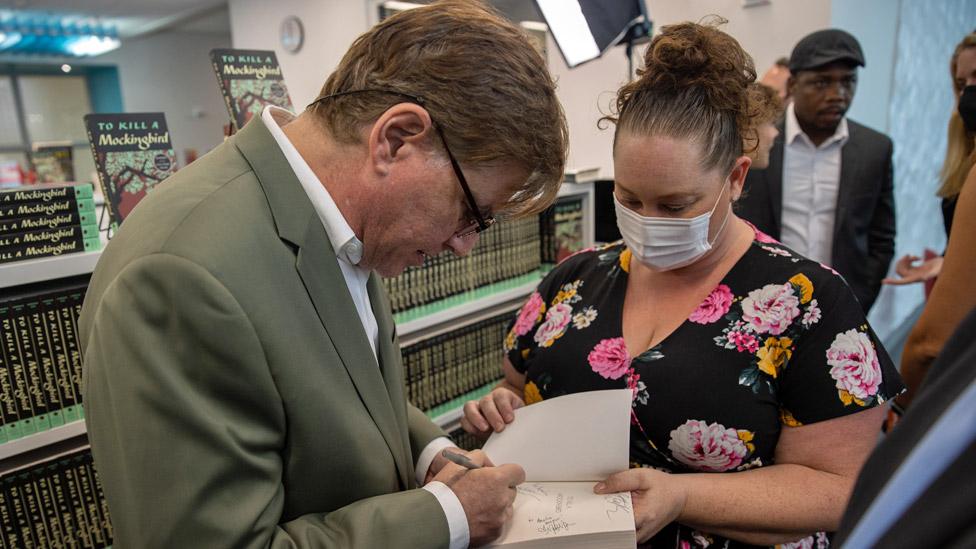Aaron Sorkin reveals he suffered a stroke: 'It was a loud wake-up call'
- Published

Sorkin said his doctor told him his blood pressure was so high he was "supposed to be dead"
Writer Aaron Sorkin has revealed he had a stroke last year, at the age of 61, which left him slurring his words for a month and having trouble typing.
The West Wing creator went to his doctor after noticing he was bumping into things and spilling his drink.
He said he was now "fine" but described the scare as "a loud wake-up call".
"I thought I was one of those people who could eat whatever he wanted, smoke as much as he wanted, and it's not going to affect me. Boy, was I wrong."
Sorkin won an Oscar for the film The Social Network and is also known for writing the scripts for A Few Good Men, Steve Jobs and The Trial of the Chicago 7.
Speaking to the New York Times, he said he first noticed something wrong when he got up in the middle of the night but crashed into walls and corners, then kept spilling his orange juice the next morning.
He went to see his doctor, who told him his blood pressure was so high "you're supposed to be dead". He was told he had suffered a stroke.

Sorkin, pictured two months before his stroke, is only just regaining the ability to sign his name
Most symptoms improved after about a month, he said, although he could not sign his name until recently and still cannot really taste food.
After the stroke, he gave up smoking, improved his diet and started working out twice a day. He said he also takes "a lot of medicine", adding: "You can hear the pills rattling around in me."
Sorkin said he decided to talk about his experience in the hope others may benefit. "If it'll get one person to stop smoking, then it'll be helpful," he told the paper.
He has recently been working on a new version of the 1960 Broadway musical Camelot, based on the legend of King Arthur and the Knights of the Round Table.
"There was a minute when I was concerned that I was never going to be able to write again," Sorkin said. "I was concerned in the short term that I wasn't going to be able to continue writing Camelot."
But he added: "Let me make this very, very clear. I'm fine. I wouldn't want anyone to think I can't work. I'm fine."
How to spot a stroke
Elaine Roberts from the Stroke Association on spotting the signs of a stroke
Face - may have dropped on one side, may not be able to smile, or the mouth or eye may have dropped
Arms - may not be able to lift both arms and keep them there
Speech - may be slurred or garbled, or the person may not be able to talk, and may also have problems understanding you
Sudden weakness or numbness on one side of the body, including legs, hands or feet
Sudden blurred vision or loss of sight in one or both eyes; sudden memory loss or confusion; dizziness or a sudden fall; a sudden, severe headache
The signs of a mini-stroke or TIA (transient ischaemic attack) are the same but only last up to 24 hours, and should be treated urgently because it is often a warning sign of a full stroke in the near future
How to cut your risk
Do not regularly drink too much alcohol
Quit smoking - smoking doubles the risk of dying from a stroke, but the risk reduces as soon as you stop
Eat a healthy diet and stay a healthy weight
Take regular exercise
Source: NHS/Stroke Association
Related topics
- Published29 October 2014

- Published29 September 2020

- Published5 October 2017

- Published9 September 2017

- Published16 December 2014
